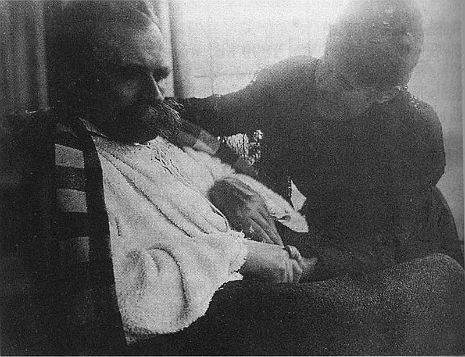
“Can I do it ‘til I need glasses?”
It was odd seeing Nietzche’s face on that pancake yesterday, as I’ve just been reading Gregor Dellin’s Richard Wagner, His Life, His Work, His Century, where I came upon a bizarre perspective on the renowned Wagner-Nietzsche feud – one far less elevated than the philosophical dispute detailed by Nietzsche in his essay “Nietzsche contra Wagner” and elsewhere.
Nietzsche, of course, spent much of his life, prior to his complete physical and mental collapse, struggling with appalling ill-health; attacks of near-blindness, madness and incapacity that ruined his academic career and are nowadays almost unanimously thought to have been the symptoms of advanced syphilis. In 1877, when Wagner and Nietzsche’s friendship was apparently in its pomp, but Nietzsche’s health was moving through an especially rocky patch, Wagner (a bullish individual, to put it mildly) instigated a correspondence with Nietzsche’s then-doctor, evincing a great deal of concern for his younger friend, but an arresting want of tact:
“In assessing Nietzsche’s condition I have long been reminded of identical or very similar experiences with young men of great intellectual ability. Seeing them laid low by similar symptoms, I discovered all too certainly that these were the effects of masturbation [by hiding under their bed, perhaps]. Ever since I observed Nietzsche closely, guided by such experiences, all his traits of temperament and characteristic habits have transformed my fear into a conviction.”
Yes, what Herr Dr. Wagner wants to focus on is the possibility that Nietzsche was, in Wagner’s words, “a confirmed masturbator.” Back then, the world’s foremost pastime was widely considered to be an extremely risky business, as Dr. Balthazar Bekker’s study of 1716 (still influential in Nietzsche and Wagner’s day) details – the following, believe it or not, are just a few of the physical consequences supposed to derive from so-called “self-abuse:”
“Disturbances of the stomach and digestion, loss of appetite or ravenous hunger, vomiting, nausea, weakening of the organs of breathing, coughing, hoarseness, paralysis, weakening of the organ of generation to the point of impotence, lack of libido, back pain, disorders of the eye and ear, total diminution of bodily powers, paleness, thinness, pimples on the face, decline of intellectual powers, loss of memory, attacks of rage, madness, idiocy, epilepsy, fever and finally suicide.”
Which must have spiced up the average wank no end. But spare a thought for young Nietzsche, who already suffered from a decent number of these symptoms and must have regularly entertained the possibility that they were, so to speak, self-inflicted, just as Wagner (indiscreetly) would later allege. Dellin makes a good case that, for Nietzsche—a sexually sensitive man in sexually sensitive times—Wagner’s betrayal of his privacy was, once he learned of the correspondence, impossible to forgive or forget, the unflattering designation made in painful proximity not only to Cossima Wagner (the chick Nietzsche most dug) but also – and worse still – history itself!
But beyond Delin’s suggestion that Nietzsche’s subsequent philosophical feud with Wagner is only a smokescreen to distract history from these rumors and resentments, I couldn’t help entertaining the idea that Nietzsche’s entire later philosophy was an elaborate refutation of the possibility that he was a “confirmed masturbator” – which Nietzsche could well have imagined his own medical history would suggest to future generations even louder than Wagner’s lay-prognosis.
After all, whichever “moral” worldview Nietzsche attacked – be it Christianity, Buddhism or Socialism – he always did so primarily on the grounds that they were only the symptoms of decadence and that the cultures in which they originated and spread had long since stopped being able to control themselves. As Nietzsche noted in Twilight of the Idols:
“There is a time with all passions when they are merely fatalities, when they drag their victim down with the weight of their folly (...) all the old moral monsters are unanimous that ‘the passions must be killed’.”
Which is to say that you would only preach against the passions if they were fucking you up in the first place! The more moral the philosophy, insisted Nietzsche, the more debauched its adherents; Christianity, then, for whom “the only ‘cure’ is castration” (“if thy eye offend thee, pluck it out”), would therefore find its natural adherents among the most hopelessly degenerate:
“Survey the entire history of priests and philosophers, and that of artists as well: the most virulent utterances against the senses have not come from the impotent, nor from ascetics, but from those who found it impossible to be ascetics, from those who stood in need of being ascetics.”
What might the private life of such a moralist and would-be ascetic look like, then, at its worst? You might envisage (were you alive in the nineteenth century, that is), none other than a chronic masturbator, one (say) whose habit had become such a “fatality” that they risked permanently blinding and paralyzing their mind and body with the “weight of their folly.”
Quite the opposite, then, of an anti-moralist like Nietzsche, who definitely didn’t have, as Bob Dylan sang, “One hand tied to the tightrope walker/ The other in his pants…”